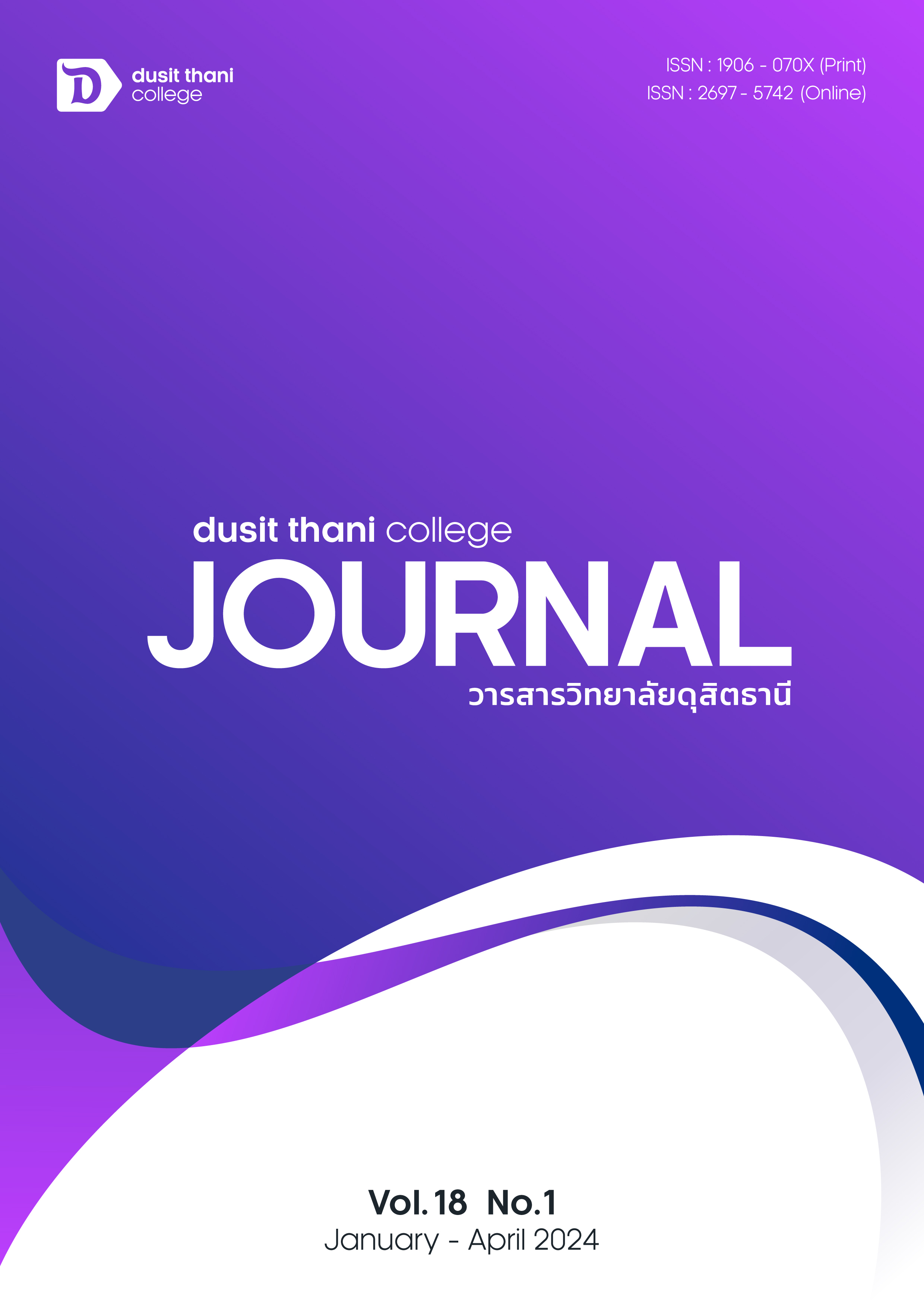การพัฒนาผลิตภัณฑ์เบเกอรี่ต้นแบบจากสารสกัดน้ำมันใบกัญชาเพื่อถ่ายทอดองค์ความรู้สู่ชุมชน
Main Article Content
บทคัดย่อ
การศึกษานี้มีวัตถุประสงค์เพื่อ 1) พัฒนาผลิตภัณฑ์เบเกอรี่ต้นแบบจากสารสกัดใบกัญชา 2) ศึกษาการยอมรับของผู้บริโภค และถ่ายทอดองค์ความรู้สู่วิสาหกิจชุมชนต้นแบบ และ 3) ศึกษาคุณค่าทางโภชนาการของ ผลิตภัณฑ์ต้นแบบเบเกอรี่จากสารสกัด ใบกัญชา การพัฒนาผลิตภัณฑ์เบเกอรี่มีขั้นตอนมาจากการคัดเลือกผลิตภัณฑ์เบเกอรี่จำนวน 4 ชนิด ได้แก่ ขนมปัง พาย เดนิช/ครัวซองค์ และคุกกี้ ผลคัดเลือกที่ได้คะแนนมากที่สุดได้แก่คุกกี้ คุกกี้ที่มีส่วนผสมของสารสกัดน้ำมันใบกัญชา พบว่าคะแนนทางประสาทสัมผัส ด้านลักษณะปรากฏ เนื้อสัมผัส รสชาติ กลิ่น และความชอบโดยรวมอยู่ในระดับชอบทุกด้าน โดยสูตรต้นแบบ สูตรที่ 1 มีคะแนนค่าเฉลี่ยสูงสุดในทุกคุณลักษณะ ผู้ทดสอบให้คะแนนความชอบด้านความชอบโดยรวมทั้ง 3 สูตรแตกต่างกันอย่างไม่มีนัยสำคัญทางสถิติ (p>0.05) ส่วนด้านลักษณะปรากฏ ด้านเนื้อสัมผัส ด้านรสชาติ ด้านกลิ่น และด้านความกรอบพบว่าคุกกี้เสริมสารสกัดจากใบกัญชา ทั้ง 3 สูตร มีคะแนนความชอบแตกต่างกันอย่างมีนัยสำคัญทางสถิติ (p≤0.05) คุณค่าโภชนาการพบว่า คุกกี้ที่มีส่วนผสมสารสกัดน้ำมันใบกัญชา 2.5 กรัม สูตรที่ 1 ในปริมาณ 100 กรัม มีพลังงานทั้งหมด 500 กิโลแคลอรี น้ำตาล 25 กรัม ไขมัน 25 กรัม โซเดียม 380 มิลลิกรัม ผลการศึกษาการยอมรับของผู้บริโภค พบว่า ด้านส่วนประสมทางการตลาด ผลการวิเคราะห์ค่าเฉลี่ย และส่วนเบี่ยงเบนมาตรฐานการของระดับความสำคัญโดยภาพรวม อยู่ในระดับความสำคัญมากที่สุด (x̅ = 4.68) เมื่อพิจารณาเป็นรายข้อพบว่า อยู่ในระดับความสำคัญมากที่สุด 3 ด้านเรียงลำดับค่าเฉลี่ยมากไปน้อยคือ ด้านผลิตภัณฑ์ หรือบริการ (x̅ = 4.92) ด้านรูปแบบบรรจุภัณฑ์ (x̅ = 4.80) และด้านช่องทางการจัดจำหน่าย (x̅ = 4.57) ตามลำดับ ส่วนด้านราคา อยู่ในระดับความสำคัญมาก (x̅ = 4.44) การถ่ายทอดองค์ความรู้ ผู้เข้าอบรมเกิดความรู้ความเข้าใจในการผลิตคุกกี้จากสารสกัดน้ำมันใบกัญชาเพื่อนำมาพัฒนาเป็นผลิตภัณฑ์ของกลุ่มวิสาหกิจต่อไป ผลการศึกษาโภชนาการ พบว่า พบว่าคุกกี้ที่มีส่วนผสมสารสกัดน้ำมันใบกัญชา ปริมาณ 100 กรัม มีพลังงานทั้งหมด 500 กิโลแคลอรี น้ำตาล 25 กรัม ไขมัน 25 กรัม โซเดียม 380 มิลลิกรัม
Article Details

อนุญาตภายใต้เงื่อนไข Creative Commons Attribution-NonCommercial-NoDerivatives 4.0 International License.
นโยบายการพิจารณากลั่นกรองบทความ
- บทความวิจัยและบทความวิชาการทุกเรื่องที่จะได้รับการตีพิมพ์ต้องผ่านการพิจารณากลั่นกรองโดยผู้ทรงคุณวุฒิ (Peer Review) ในสาขาที่เกี่ยวข้อง จำนวน 3 ท่าน/บทความ
- บทความ ข้อความ ภาพประกอบและตารางประกอบที่ลงตีพิมพ์ในวารสารเป็นความคิดเห็นส่วนตัวของผู้เขียน กองบรรณาธิการไม่จำเป็นต้องเห็นด้วยเสมอไป และไม่มีส่วนรับผิดชอบใด ๆ ถือเป็นความรับผิดชอบของผู้เขียนแต่เพียงผู้เดียว
- บทความที่จะได้รับการตีพิมพ์จะต้องไม่เคยตีพิมพ์ เผยแพร่ที่ใดมาก่อน และไม่อยู่ระหว่างการพิจารณาของวารสารฉบับอื่น หากตรวจสอบพบว่ามีการตีพิมพ์ซ้ำซ้อน ถือเป็นความรับผิดชอบของผู้เขียนแต่เพียงผู้เดียว
- บทความใดที่ผู้อ่านเห็นว่าได้มีการลอกเลียนหรือแอบอ้างโดยปราศจากการอ้างอิง หรือทำให้เข้าใจผิดว่าเป็นผลงานของผู้เขียน กรุณาแจ้งให้กองบรรณาธิการวารสารทราบจะเป็นพระคุณยิ่ง
เอกสารอ้างอิง
Chaemmek, C., & Naivikul, O. (2006). Basic bakery technology. (8th ed). Bangkok: Kasetsart University.
Deeammart, J., Boonprasid, N., Yamchomsuan, C., & Thiakson, S. (2018). Nutritional supplementation using spinach powder in butter cookies. Journal of Science and Technology, Udon Thani Rajabhat University, 6(2), 43-52.
Department of Thai Traditional and Alternative Medicine. (2023). Guidance on cannabis for medical use based on traditional Thai medicine knowledge. Bangkok: Beyond Publishing.
Kertsiri, S., & Thongchew, S. (2021). Development of butter cookie with wild Melientha suavis. Vocational Education Central Region Journal, 5(2), 107-112.
Khaomouang, K., & Suteebut, N. (2020). Product development of Perilla seed cookies. In RSU National Research Conference 2020 (pp. 683-391). Rangsit University, Bangkok.
Liaotrakoon, W., & Liaotrakoon, V. (2017). Product development of bottled brine bolete of Sam Ruean subdistrict, Bang Pa-in district, Phra Nakhon Si Ayutthaya province. Journal of Community Development and Life Quality, 5(1), 174-185.
Moohammad, L., Lektrakool, K., Kadnok, N., Rerkchokdee, S., Julratee, G., Prayatyot, T., & Sangthongaram, C. (2023). Butter cookies supplemented with dragon fruit peel. Journal of Academic Science, Rajabhat University Chandrakasem, 33(1), 34-40.
Nanthachai, N., Wanmatha, P., Pathee, A & Bhuthong. N. (2015). Effects of mulberry leaf supplementation on the quality of butter cookies. Faculty of Agricultural Science, Kasetsart University 46(3), 293- 296.
Notification of the Ministry of Public Health (No. 427), B.E. 2564 2021 issued under the food Act, B.E. 2522 (1979) re: Food products containing certain part of cannabis or hemp. (2021, July 5). Thai Government Gazette. Vol. 138 Special Part 168D. pp. 22-24.
Notification of the Ministry of Public Health. Possession of narcotics of category 5, cannabis, that are consumable for treatment of diseases before Narcotics Act (No. 7) B.E. 2562. (2019, February 25). Thai Government Gazette. Vol. 136 Special Part 49D. pp. 5-6.
Patasema, S. (2023). Medical cannabis: Buddhist wisdom to disruption society. The Journal of Buddhist Innovation Review, 4(1), 13-26.
Poonnakasem, N. (2016). Development of butter cookie with fiber from pomelo albedo. SDU Research Journal Science and Technology, 9(1), 35-49.
Radapong, S., Suppajariyawat, P., & Phadungkit, M. (2021). Pharmacological and toxicological effects of cannabis. Journal of the Department of Medical Sciences, 63(1), 219-232.
Rodmui, A., & Jitwaropas, O. (2007). Production of cookies using wheat flour partial substituted with Hom Nin rice flour. Journal of Food Technology, Siam University, 3(1), 37-43.
Rossukon, J. (2022). Method for separating active substances in Kratom and cannabis [Master’s thesis]. Silpakorn University, Nakhon Pathom.
Silpcharu, T. (2006). Research and statistical data analysis with SPSS. (7th ed.). Bangkok: Business R&D.
Uttaranakorn, W., & Panthong, S. (2023). Factors influencing the decision to purchase healthy bakery in a health bakery shop in Bangkok. Suthiparithat, 37(1), 78-92.


